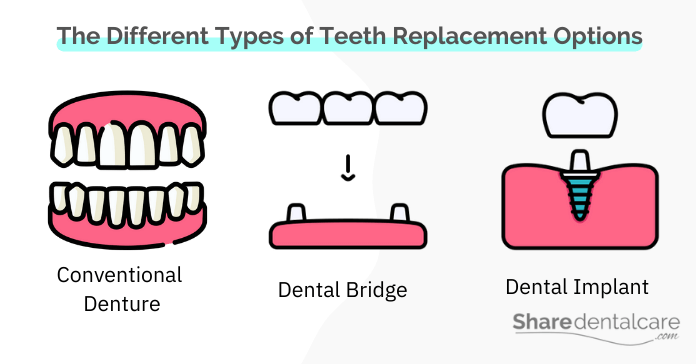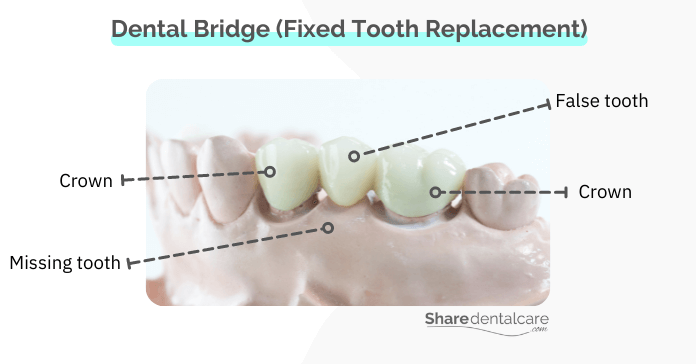Tooth loss is a very common problem that happens to people of all ages. There are many different types of teeth replacement available for those who suffer from tooth loss, including dentures, bridges, and implants. It is important to note that each one has its benefits and drawbacks to consider. In this article, you will learn about different types of teeth replacement options to help you make an informed decision.
Importance of Teeth & Consequences of Their Loss
The teeth help you communicate with others and give you a beautiful smile and an attractive look. Teeth also play a vital role in chewing food to make it easier for digestion. For these reasons, losing one or more teeth can have an impact on confidence, oral health, and overall health. Consequences of tooth loss include:
- Difficulty chewing and speaking.
- Poor nutrition due to the inability to chew and swallow certain foods, which can affect your growth, development, and physical performance.
- Missing teeth can make you look older.
- Misalignment of other teeth over time if missing teeth are not replaced.
- Inability to maintain good oral health and hygiene, which can lead to periodontal diseases, dental caries, or other complications.
- Missing teeth can affect your smile, which can lower your self-esteem.
- Increased cardiovascular risk due to the inability to maintain good nutrition and oral hygiene.
If you have lost one or more teeth, there are different types of teeth replacement options to help you restore your teeth function, smile, and improve your self-esteem.

The Different Types of Teeth Replacement Options
There are many different types of teeth replacement options available such as dentures, bridges, and implants. Each of these options has benefits and drawbacks.
Conventional Dentures
Dentures are removable replacements for missing teeth. They consist of an acrylic base that sets on your gums. Dentures can be complete, which replace all of the teeth in adult patients with no teeth, or partial, which only replace some of your teeth. Partial dentures have clasps that connect them to adjacent teeth, for example, partial dentures for molars.
- Advantages of Dentures:
- They are the most affordable treatment option in comparison with the different types of teeth replacement.
- They can be removed and cleaned easily.
- There is no need for surgery.
- They work and feel natural once they have been adjusted to your mouth.
- Disadvantages of Dentures:
- They can worsen existing jawbone problems and affect the ability to chew your food.
- You may experience discomfort or pain when using them.
- It takes time for your denture to feel like a natural part of your mouth.
- They can break if they are not cared for properly.

Dental Bridges
Dental bridges are fixed replacements for missing teeth. They are a popular teeth replacement option that consists of a false tooth or teeth connected to two crowns on each side. There are many bridge types in dentistry.
- Advantages of Dental Bridges:
- They are a durable solution that lasts for many years.
- They help prevent other teeth from shifting or moving out of place.
- For those who have partial dentures, dental bridges can be the perfect solution. Read more about the pros & cons of a bridge for two missing teeth.
- Disadvantages of Dental Bridges:
- They are more expensive than dentures.
- You need to have healthy and strong teeth on both sides of the gap to use a dental bridge.
- The different types of replacement options available to you will need different types of care. Dentures, for example, are easier to clean and maintain when compared with dental bridges and implants.
- They are not suitable for patients with no teeth or long missing teeth gap. You will need dental implants to support dental bridges. Read more about why your dental bridge broke in half.

Dental Implants
Dental implants are becoming more and more popular. Dental implants consist of titanium posts that are surgically placed into your jawbone. After the healing (osseointegration), you will be able to securely attach different types of teeth replacement such as crowns, bridges, or dentures onto them. Know more about the differences between zirconia vs titanium implants.
- Advantages of Dental Implants:
- They are long-lasting and durable. Implants can last a lifetime with proper care.
- They provide you with a natural look and feel as if they were your teeth.
- No need for the preparation of adjacent teeth.
- Disadvantages of Dental Implants:
- Dental implants are very expensive.
- They require surgery.
- You may need bone grafting for dental implants, which will cost you more and increase the healing period.
What to Consider When Choosing Between Different Types of Teeth Replacement
Before choosing different types of teeth replacement, should consider several factors:
- Cost: dental bridges or implants are more costly than dentures.
- Durability: types of teeth replacements are different in terms of durability. For example, a dental bridge could last for 15 years and even longer, but a denture might only last 5-10 years before requiring replacement.
- Comfort: implants and bridges are more comfortable to wear and use.
- Aesthetics: implants and bridges give you a more natural and beautiful look when compared to dentures.
- The condition of remaining teeth: bridges require healthy and strong teeth on both sides of the gap for support.
- The condition of the jaw bone: implants require a healthy and strong jaw bone for a successful treatment. In cases of insufficient bone, you may need bone grafting for dental implants, which increases the cost and healing period.
How Different Types of Teeth Replacement Can Affect Your Confidence?
When choosing between the different types of teeth replacement, you should consider how they can affect your sense of confidence. Dentures, for example, can make you feel self-conscious about the way you look. If dentures are constantly slipping out of place or not staying in place due to a poor fit, then this could make them less satisfying and thus cause you to feel less confident.
At the same time, a dental implant or bridge can give you a sense of confidence because they are long-lasting and durable solutions that will not slip out of place easily. You won’t have to worry about them slipping off every so often in a situation where you need them for speaking, eating, or smiling. Read more about “a removable denture or fixed bridge for one missing tooth“.
Different Types of Teeth Replacement – Conclusion
Different types of teeth replacement are available to you as a patient at both affordable and premium costs. Dental implants and bridges provide more natural-looking solutions that can last you a lifetime but they tend to be more expensive than dentures. Dentures, on the other hand, are cheaper but don’t give you a more natural look and are less durable.
Choosing different types of teeth replacement will depend on your budget, the condition of remaining teeth, the condition of jawbone, and your preferences. You will need to consult with a dentist about which type is best for you.